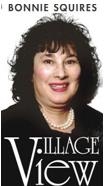Village View: Honoring self-advocates and community members during Intellectual Disability Awareness Month
By Bonnie Squires

Please notice that IDS spells the word “disability” with a lower-case “d” and an upper case “A.” That’s because Kathy L. Sykes, the director of IDS, and her staff, including coordinator of the awards luncheon and the Public Awareness Committee Judy Kresloff, always focus on the positive. On what people can do, not what they cannot.
The uber-boss, Commissioner Arthur C. Evans, Jr., Ph.D., head of the Department of Behavioral Health and Intellectual disAbility Services focuses on “recovery” in his supervision of mental health services.
Dr. Beth Mount, a nationally recognized artist and advocate has for decades subscribed to the philosophy that art can find capacities in each of us, and people with different abilities open spaces in which we all can become artists of social change.
“Inclusion” is the new buzz-word in the intellectual and developmental disability community, and it means that every single person has something to contribute to society. In fact, for decades, the IDS Brighter Futures Awards luncheon has also been called, “MyCity MyPlace.”
In her slide presentation, Dr. Mount talked about people whom she had known, admired, and
helped to find their place in society. One story in particular captivated me. She talked about a young man named Eric, who lived with his parents in New York, where Dr. Mount now lives and works.
Eric was blind, deaf, and diagnosed with severe intellectual disability. His parents had to place splints on his arms and make him wear a helmet 24 hours a day, as he was always self-abusing. Until the age of 13, when his mother decided--there had to be a place in the world for her son.
She decided that he enjoyed relating to animals, so she did her research and discovered that a mere 10 minutes from her home was a working farm, deemed a museum, with hens and chickens and cows and horses. Thousands of New York City schoolchildren are bused there every week to have their first experience with farm animals.
Eric, now a young adult, has been working 30-hour weeks there, without splints, without a helmet, collecting and selling chickens’ eggs, cleaning up after the horses, and, with his limited hand-sign language, communicating with students. The director of the farm says that Eric is his best teacher.
ที่มา: http://mainlinemedianews.com/articles/2013/03/18/main_line_times/opinion/doc51473086d0655348380742.txt (ขนาดไฟล์: 162)
วันที่โพสต์: 28/03/2556 เวลา 04:16:51 
![]()
![]()
แสดงความคิดเห็น
รายละเอียดกระทู้
By Bonnie Squires http://mainlinemedianews.com/articles/2013/03/18/main_line_times/opinion/doc51473086d0655348380742.txt Bonnie SquiresDid you realize that March is Intellectual Disability Awareness Month? Well, it is. Philadelphia Intellectual disAbility Services, the city agency that oversees services and providers for 12,000 citizens with that diagnosis, hosted its 21st annual Brighter Futures Awards ceremony two weeks ago, combined this year with the 12th annual Points of Transformation Awards. Please notice that IDS spells the word “disability” with a lower-case “d” and an upper case “A.” That’s because Kathy L. Sykes, the director of IDS, and her staff, including coordinator of the awards luncheon and the Public Awareness Committee Judy Kresloff, always focus on the positive. On what people can do, not what they cannot. The uber-boss, Commissioner Arthur C. Evans, Jr., Ph.D., head of the Department of Behavioral Health and Intellectual disAbility Services focuses on “recovery” in his supervision of mental health services. Dr. Beth Mount, a nationally recognized artist and advocate has for decades subscribed to the philosophy that art can find capacities in each of us, and people with different abilities open spaces in which we all can become artists of social change. “Inclusion” is the new buzz-word in the intellectual and developmental disability community, and it means that every single person has something to contribute to society. In fact, for decades, the IDS Brighter Futures Awards luncheon has also been called, “MyCity MyPlace.” In her slide presentation, Dr. Mount talked about people whom she had known, admired, and helped to find their place in society. One story in particular captivated me. She talked about a young man named Eric, who lived with his parents in New York, where Dr. Mount now lives and works. Eric was blind, deaf, and diagnosed with severe intellectual disability. His parents had to place splints on his arms and make him wear a helmet 24 hours a day, as he was always self-abusing. Until the age of 13, when his mother decided--there had to be a place in the world for her son. She decided that he enjoyed relating to animals, so she did her research and discovered that a mere 10 minutes from her home was a working farm, deemed a museum, with hens and chickens and cows and horses. Thousands of New York City schoolchildren are bused there every week to have their first experience with farm animals. Eric, now a young adult, has been working 30-hour weeks there, without splints, without a helmet, collecting and selling chickens’ eggs, cleaning up after the horses, and, with his limited hand-sign language, communicating with students. The director of the farm says that Eric is his best teacher.
จัดฟอร์แม็ตข้อความและมัลติมีเดีย
รายละเอียดการใส่ ลิงค์ รูปภาพ วิดีโอ เพลง (Soundcloud)

